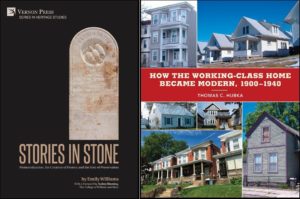 The 2021 University of Mary Washington Center for Historic Preservation Book Prize Committee is proud to announce that this year, they could not choose just one winner. There were two books that approached the discipline of historic preservation in new and groundbreaking ways: Thomas C. Hubka’s How the Working-Class Home Became Modern, 1900-1940 and Emily Williams’ Stories in Stone: Memorialization, the Creation of History and the Role of Preservation. From two very different perspectives and utilizing different methodologies, each volume successfully brought light to previously untold narratives in the past and teach us better, more rich ways of exploring the historic record. Both volumes challenge and expand the way we determine significance of a place or object.
The 2021 University of Mary Washington Center for Historic Preservation Book Prize Committee is proud to announce that this year, they could not choose just one winner. There were two books that approached the discipline of historic preservation in new and groundbreaking ways: Thomas C. Hubka’s How the Working-Class Home Became Modern, 1900-1940 and Emily Williams’ Stories in Stone: Memorialization, the Creation of History and the Role of Preservation. From two very different perspectives and utilizing different methodologies, each volume successfully brought light to previously untold narratives in the past and teach us better, more rich ways of exploring the historic record. Both volumes challenge and expand the way we determine significance of a place or object.
In How the Working-Class Home Became Modern, Hubka works to correct our focus on high-style and upper-class housing by demonstrating the importance of change over time in small and often over-looked buildings. His sweeping work provides a way to study vernacular architecture of the working class as a topic worthy of its own focus. In so doing, Hubka makes a compelling argument that historic preservation has historically ignored the significance of working-class houses and the manner in which their owners were able to expand their properties and acquire services such as water, electricity, gas, sewer, kitchen appliances, and the indoor three-fixture bathroom suite. Through a wealth of illustrations, period photographs and drawings, and detailed timelines of the introduction of new technologies, Hubka has produced an enduring resource that will allow architectural historians to better assess and contextualize the fragmented and gradual modernization of vernacular buildings.
Williams’ Stories in Stone is a powerful demonstration of how a multidisciplinary micro-historical and object-biography approach can uncover an expansive story that reveals not only the rich history of the objects themselves, but can also combat areas in which the historical narrative has long been too narrow or circumscribed. Williams examines two gravestones from Williamsburg’s 19th-century African American community that could have been relegated to a footnote in the historical record. Instead, through an exploration of the life cycle of the gravestones, Williams uses the excavation, curation, public engagement, and interpretation of the objects to deepen our understanding of free African American agency, to create a historiography of the preservation discipline, and to assess how we create and maintain memory. The work provides an excellent model for preservationists interested in using compelling artifacts to address histories previously suppressed or ignored in the historic record.
These impactful and evocative books provide us a way to study and understand the power of the narrative in the object. One book is more technical and methodological, providing a guide to understanding the tangible and the history and use of those objects, and the other weaves an expansion of the historical record through a painstaking examination of two objects. Both Hubka and Williams add richness to the histories of groups long underrepresented in elitist histories and traditional preservation practice, creating resources that preservationists can employ to broaden our understanding of the past and our discipline.
The University of Mary Washington Center for Historic Preservation has awarded this prize annually since 1989 to the book (or books) with the most potential for positively impacting the discipline of historic preservation in the United States. In making its selection, the jury focuses on books that break new ground or contribute to the intellectual vitality of the preservation movement. Winners receive a monetary prize and are invited to give a lecture at UMW. This year is the first time since 1990 in which two books have received the prize, which according to this year’s jury, is reflective of the diversity of modern preservation practice. The jury was comprised of preservation academics, professionals, alumni, and a current student.
2021 University of Mary Washington Book Prize Committee:
Dr Lauren K. McMillan, Assistant Professor of Historic Preservation, University of Mary Washington (Chair)
Dr. Dan Hubbard, Associate Professor of Historic Preservation, University of Mary Washington
Dr. Lisa P. Davidson, Historian, National Park Service
Claire Ross, UMW Class of 2021, Departments of Historic Preservation and Anthropology, University of Mary Washington
Dr. Ellen Chapman, Cultural Resources Specialist, Cultural Heritage Partners
Maribeth B. Mills, Development Coordinator, Restoration Housing